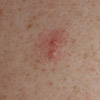A pox on your house! How to deal with chicken pox
For most people, chicken pox is a part of growing up. The red lumps, the itchiness, the whinging. Not to mention the fever, fatigue, irritability and discomfort. And while chicken pox is not a serious condition in itself, it can lead to a nastier condition called shingles. This is why it’s important to prevent chicken pox in your family and community through vaccination.
Vax stats
Chicken pox is extremely contagious. It’s so contagious that just being in contact with an infected person can transfer it. The virus, known as the varicella virus, can be spread through the air or by touching another person’s chicken pox sores.
It mainly affects young people; 95% of ‘chicken poxers’ are under 20, and 75% are under 12 years. But rugrats aged 0–4 are most at risk, so we need to make sure we protect them.
Back in the ol’ days, nearly everyone copped a bout of chicken pox. Fortunately we now have a vaccine. However, some people are still not vaccinated, so it can still crop up from time to time.
Prevention: I don’t feel like chicken tonight
The only way to prevent chicken pox is to be vaccinated. People under 14 years need two doses of the vaccine, spaced at least two months apart. But most people only require one dose.
If you are unvaccinated but have recently been exposed to the virus, maybe through someone in your home, you can get an injection of varicella-zoster immunoglobulin within 96 hours of exposure to reduce the chance of getting sick.
Symptoms: Do not taste like chicken
First up, you’ll get a headache and maybe a fever. All round, you’ll won’t feel your best. About 48 hours later, the ‘pox’ begins. It will look red, lumpy and rash-like. Most of all, it will be more itchy than you can bear.
To be more specific, the first week of the skin rash is characterised by small fluid-filled blisters (less than 1 cm diameter). The blisters then fill with pus before bursting and drying out. Grossed out yet?
This can be up to 20 days of pus-filled fun, and may include several types of blisters (e.g. fluid-filled or dried out) at the same time.
Note that chicken pox blisters are very contagious until they have dried out.
The gift that keeps on taking
If you need more reasons to get vaccinated, how about ear infection? The skin blisters can also get infected, and liver infection (hepatitis) is known to occur. Another serious consequence that can arise from chicken pox is lack of coordination (cerebellar ataxia). The older you are when you get chicken pox, the more severe the symptoms can be.
As we mentioned, having been infected with chicken pox increases the risk of developing a serious condition called shingles. While older people do not usually get chicken pox, those who contracted chicken pox earlier in their life are at risk of a shingles.
And if a pregnant woman contracts chicken pox, she can pass it to her foetus, resulting in serious problems. So it’s important for expecting ladies to get vaccinated at least a month before the stork arrives.
Treatment: Out! Out! Damned spot!
A doctor can diagnose chicken pox from discussing and examining your symptoms. If there needs to be further medical confirmation, tests are available. Treatment aims to keep you as hydrated as possible – and, yes, they can do something about the itching, usually with non-prescription anti-itch creams. This is important because you shouldn’t be scratching at the blisters – you could make them scar.
If you do get a bout of the pox, you will need to stay at home and away from people. You may feel like a bit of a social outcast, but it won’t be for long.
Pockmarked for destiny
Chicken pox can be a real bummer and can lead to some very nasty complications. If you’re unlucky enough to get infected, get to the doctor ASAP and don’t scratch! Otherwise, vaccination is the only real prevention so you don’t get pockmarked for destiny.
Conclusion
- Chicken pox is very uncomfortable and very contagious – it also has potentially serious consequences later in life.
- Vaccination is the only way to prevent the disease. If you haven’t been vaccinated or are unsure, talk to your doctor.
- If you do get infected, stay away from other people and don’t scratch.
More information
 | For more information about chicken pox, including what it is, statistics, risk factors, symptoms, diagnosis, prognosis and treatment, see Chicken Pox (Varicella Zoster Virus). |
Dates
Tags
Created by:

 Login
Login














